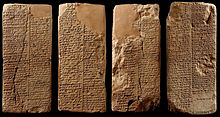Ubara-Tutu
Appearance
| Ubara-Tutu | |
|---|---|
 The Weld-Blundell Prism is among the oldest, most well-preserved, and better-known versions of the Sumerian King List, and includes the inscription for Ubara-Tutu.[1] | |
| High King of Sumer | |
| Predecessor | En-men-dur-ana[2] |
| Successor | Jushur |
| King of Shuruppak | |
| Predecessor | Unknown |
| Successor | Ziusudra |
| Born | Shuruppak |
| Sumerian | 𒁛𒁺𒁺[3] |
| Dynasty | Dynasty of Shuruppak |
Ubara-tutu (or Ubartutu) of Shuruppak was the last antediluvian king of Sumer, according to some versions of the Sumerian King List. He was said to have reigned for 18,600 years (5 sars and 1 ner). He was the son of En-men-dur-ana, a Sumerian mythological figure often compared to Enoch, as he entered heaven without dying. Ubara-Tutu was the king of Sumer until a flood swept over his land.[4]
Ubara-tutu is briefly mentioned in tablet XI of the Epic of Gilgamesh. He is identified as the father of Utnapishtim, a character who is instructed by the god Ea to build a boat in order to survive the coming flood.[5]
See also
[edit]References
[edit]- ^ Ashmolean 2017.
- ^ Black et al. 2006.
- ^ Sjöberg, Leichty & Tinney 2021.
- ^ Pritchard, James B. (ed.), Ancient Near Eastern Texts Relating to the Old Testament (Princeton, N.J.: Princeton University Press, 1955, 1969). 1950 1st edition at Google Books. p.44: "...a flood [will sweep] over the cult-centers; to destroy the seed of mankind; is the decision, the word of the assembly [of the gods]."
- ^ George, Andrew R. (2003). The Epic of Gilgamesh: The Babylonian Epic Poem and Other Texts in Akkadian and Sumerian. Penguin Classics. ISBN 9780241289907.
Bibliography
[edit]- Ashmolean (2017). "Sumerian king list". Ashmolean Museum. Retrieved 2021-08-02.
- Black, Jeremy Allen; Baines, John Robert; Dahl, Jacob L.; Van De Mieroop, Marc (2006) [c. 1900–1600 BC]. Cunningham, Graham; Ebeling, Jarle; Flückiger-Hawker, Esther; Robson, Eleanor; Taylor, Jon; Zólyomi, Gábor (eds.). "The Sumerian king list". Faculty of Oriental Studies. Electronic Text Corpus of Sumerian Literature (ETCSL) (in Sumerian). Translated by Jacobsen, Thorkild Peter Rudolph; Glassner, Jean-Jacques; Römer, Willem H. Ph.; Zólyomi, Gábor (revised ed.). United Kingdom of Great Britain and Northern Ireland: University of Oxford. Retrieved 2021-07-31.
After the kingship descended from heaven, the kingship was in Eridug. In Eridug, Alulim became king; he ruled for 28800 years. Alaljar ruled for 36000 years. 2 kings; they ruled for 64800 years. Then Eridug fell and the kingship was taken to Bad-tibira. In Bad-tibira, En-men-lu-ana ruled for 43200 years. En-men-gal-ana ruled for 28800 years. Dumuzid, the shepherd, ruled for 36000 years. 3 kings; they ruled for 108000 years. Then Bad-tibira fell (?) and the kingship was taken to Larag. In Larag, En-sipad-zid-ana ruled for 28800 years. 1 king; he ruled for 28800 years. Then Larag fell (?) and the kingship was taken to Zimbir.
- Sjöberg, Åke Waldemar; Leichty, Erle; Tinney, Steve (2021) [2003]. "Pennsylvania Sumerian Dictionary Project". Pennsylvania Sumerian Dictionary Project (PSD). Retrieved 2021-07-31.
